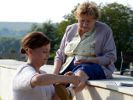Eye For Film >> Movies >> Home Care (2015) Film Review
Home Care
Reviewed by: Jennie Kermode

Slávek Horák's bold debut, inspired by things he was told about his own mother's life, is a refreshing take on the terminal illness genre. Avoiding the usual sentiment and the over-familiar narrative paths these stories usually tread, it instead focuses on what the diagnosis of such an illness means to a particular person - how it changes her perspective and affects the way she approaches being alive. This also gives it room to explore the broader experiences of people who don't fit socially expected narratives at times of perceived crisis, something which gives it access to a rich vein of absurdist humour.
The individual in question is Vlasta (a suitably forceful Alena Mihulová), a dedicated home care nurse, wife and mother of a grown-up daughter. She loves her work, but it's hard, and sometimes she gets rid of the stress by bitching about apparently trivial things like the tunnel being built under a nearby road to allow frogs to cross in safety. It's a pointless scheme, she suggests - who will teach the frogs to use it? But then a swerve on that same road to avoid hitting a frog lands her in hospital with her stomach torn open, and in the process of removing a fragment of motorbike from inside it, the doctor finds cancer that it's too late to treat.

There are many clichés out there about medically trained people who need care themselves - how difficult they supposedly are and how foolishly they struggle to avoid being dependent on others. Some critics seem to have read Home Care this way, but in general it avoids that - Vlasta's desire to keep working is presented as entirely reasonable. When she questions the logic of a doctor who suggests she take it easy, he doesn't have an answer for her. What, after all, could she stand to gain? Where she does stray from this rational approach - much to her husband's frustration - is in choosing to go down a spiritualist healing path, but this is intelligently handled and draws out key points of tension in their relationship. Finding herself in unfamiliar territory, she needs to navigate her own path on her own terms. He, meanwhile, may have the wit to be skeptical about magical cures but lacks the wit to approach the matter sensitively. It's one of several factors that contrive to pull them apart, but there are hints that their distance has existed unacknowledged for some time. Perhaps it needs to get worse before it can get better.
There's just one scene here that really rings false, and that's when Vlasta goes to visit a patient and is shocked to find him out of his wheelchair, immediately assuming that he's been lying about being disabled. Not only is it commonplace for people who need wheelchairs to go any distance to get out of them for short trips like going to the toilet, as the patient says he has been doing, but the row they then have over the nature of his problem is bizarre - nurses don't treat patients without being privy to their diagnoses and they generally know better than to take patients' flustered explanations at face value, given that many people are embarrassed to acknowledge the extent of their disabilities. One assumes this is based on a real story which Horák misunderstood, but it's really unfortunate as it doesn't make sense for the character and it promotes an idea that encourages hostility towards some wheelchair users in real life. If a future cut is produced, e.g. for the DVD market, it would be best edited out.
This aside, Home Care is a thoughtful film which finds plenty of fresh dramatic potential in its subject. Vlasta is a vibrant character, ably played, and Horák strikes a good balance between distress and joie de vivre. There are no weak links in the supporting cast and the whole is a very polished, impressive first piece of work. This director is plainly one to watch.
Reviewed on: 14 Feb 2016
















